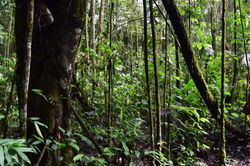Caterpillars & Climate Change in Costa Rica
-My Experience Working with Earthwatch

CATERPILLARS & CLIMATE CHANGE IN COSTA RICA
About Me
Welcome to my blog! My name is Connor Pagliaro, and I am a senior majoring in Environmental Studies at Rhode Island College in Providence, Rhode Island. Ever since I began pursuing a career in this field of study I had always wanted to travel abroad with a goal in mind of participating in something that would be meaningful to science, as well as my educational development. When it was recommended that I volunteer for an Earthwatch Expedition, I was instantly captivated by the vast array of opportunities that they offer to get an on-hands experience working alongside a scientist and collaborating with other members of an Earthwatch team. In the fall of 2017, I signed up for Climate Change and Caterpillars in Costa Rica, an expedition that took me deep into to the lush rain-forests of Costa Rica, and it was an experience I will truly never forget.

What is Earthwatch?
My experience volunteering for a trip of a lifetime
When I had first began looking for an expedition to participate in through the Earthwatch Institute, I was blown away by all the opportunities they offered. Earthwatch conducts thousands of expeditions each year, in 50 different countries throughout the world. Volunteers like myself have the opportunity to help leading scientists conduct important research dealing with some of Earths most pressing environmental concerns in many different fields of study, with expeditions categorized into wildlife & ecosystems, climate change, archaeology, and ocean health. When I finally decided to sign up for Caterpillars and Climate Change in Costa Rica, I knew an incredibly interesting journey was ahead. So, on December 31, 2017 I headed to the La Selva Biological Station, located in the protected rain forests of Northeastern Costa Rica along with a team of volunteers to help collect research data on what’s been affecting parasitism rates in caterpillar populations of the area.


Map of the La Selva Biological Station and the surrounding forest

Accomodations at La Selva

Why Caterpillars?
Climate Change & its Effects on Biodiversity
The lead scientists on this expedition, Dr. Lee Dyer and Dr. Angela Smilanich of the University of Reno, Nevada, set out on the Caterpillars and Climate Change in Costa Rica expedition with a team of volunteers & I to the La Selva Biological Station with the goal of examining factors that affect interactions among plants, caterpillars, and their natural enemies, called parasitoids. One of the ways climate change is studied is by observing these tri-trophic interactions and how they have changed over time due to global increases in the average temperature of Earth, as well as the frequency of extreme weather events such as flooding. Parasitoids play an important role in controlling the populations of caterpillars, which in turn controls how much biomass (plants) is consumed by caterpillars, but in recent decades rates of parasitism in caterpillars has been in decline, especially in tropical areas such as La Selva, Costa Rica, home to some of the highest measured biodiversity on Earth.
As a result of this decline, caterpillar populations are booming while the amount of biomass available to feed caterpillar populations struggles to keep up. It is hypothesized that climate change along with the increased frequency of dramatic weather events is responsible for the decreasing parasitism rates, as well as parasitoid diversity in Costa Rica, however despite the years of data on interactions between plants, caterpillars and parasitoids, only recent analyses have shown the most severe declines in parasitism. Furthermore, while plant-insect-parasitoid interactions have been documented quite heavily, documentation of individual parasitoid species has remained scarce, and expansion of the current catalogue of these interactions is needed to further test this hypothesis. This is where Earthwatch comes in- the task of collecting caterpillars and ‘rearing’ them for parasitoids is a laborious and time-consuming task, and the data the team and I collected will enable scientists to assess the full impact climate change has had on the important role parasitoids play in ecosystem stability.



Our Recent Posts
Tags
Here's some of my favorite macro shots taken by our group!


Some data on the caterpillars we collected


Thanks for checking out my blog! Traveling with Earthwatch on the Caterpillars & Climate Change in Costa Rica expedition was truly a life-changing experience. Going into this I was slightly nervous, having never been to a foreign country before, and taking this step out of my comfort zone has benefited me immensely in terms of personal development. Taking this chance to immerse myself in an entirely new culture while meeting some fantastic people along the way has greatly strengthened my networking and communication skills, as well as my ability to work independently when completing tasks in the ambient lab. Aside from that, the chance to help real scientists conduct research, collaborate with other volunteers to figure out the most efficient way to complete a task, and getting hands-on experience being out in the field in the Costa Rican rainforest are all skills that I can now confidently bring with me on my future endeavors as I begin my path towards a career in environmental science.
 |  |  |
|---|---|---|
 |  |  |
 |  |  |
 |


















